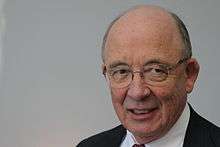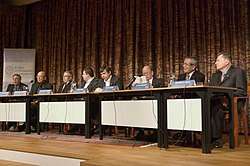Dale T. Mortensen
Dale Thomas Mortensen (February 2, 1939 – January 9, 2014) was an American economist and Nobel laureate.
Dale T. Mortensen | |
|---|---|
 Mortensen in 2010 | |
| Born | February 2, 1939 |
| Died | January 9, 2014 (aged 74) |
| Nationality | American |
| Institution | Northwestern University |
| Field | Labor economics |
| Alma mater | Carnegie Mellon University Willamette University |
| Doctoral advisor | Michael C. Lovell |
| Doctoral students | Ronald G. Ehrenberg |
| Awards | IZA Prize in Labor Economics (2005) Nobel Memorial Prize in Economic Sciences 2010 |
| Information at IDEAS / RePEc | |
Early life and education
Mortensen was born in Enterprise, Oregon.[1] He received his BA in economics from Willamette University and his PhD in Economics from Carnegie Mellon University.[2]
Career

Mortensen had been on the faculty of Northwestern University since 1965 and a professor of Managerial Economics and Decision Sciences at the Kellogg School of Management since 1980.[3] He was the Niels Bohr Visiting Professor at the School of Economics and Management, Aarhus University, from 2006 to 2010.[4]
He was awarded the Nobel Prize in Economics jointly with Christopher A. Pissarides from the London School of Economics and Peter A. Diamond from the Massachusetts Institute of Technology in 2010[5] "for their analysis of markets with search frictions".[6] In May 2011, Mortensen was awarded an honorary doctorate from his alma mater, Willamette University.[7] He was married to Beverly Mortensen, also a Northwestern Professor.
Mortensen's research focused on labor economics, macroeconomics and economic theory. He is especially known for his pioneering work on the search and matching theory of frictional unemployment. He extended the insights from this work to study labor turnover and reallocation, research and development, and personal relationships.
Mortensen was a past president of the Society of Economic Dynamics and one of the founding editors of the Review of Economic Dynamics.
Death
Mortensen died of stage 4 lung cancer on January 9, 2014, at the age of 74, at his home in Wilmette.[8][9][10][11]
Awards, fellowships
- Alexander Henderson Award, 1965
- Fellow, Econometric Society, 1979
- Fellow, American Academy of Arts and Sciences, 2000
- IZA Prize in Labor Economics, 2005
- Nobel Prize in Economics, 2010; joint with Christopher A. Pissarides and Peter A. Diamond[6]
The Dale T. Mortensen Building
In February 2011, Mortensen had a building named in his honor at Aarhus University. The Dale T. Mortensen Building is the central hub for all international and PhD activities and contains the new PhD House, Dale's Café, the university's International Centre and the new IC Dormitory for international PhD students.[12]
Selected publications
- D. Mortensen and E. Nagypál (2007), 'More on unemployment and vacancy fluctuations.' Review of Economic Dynamics 10 (3), pp. 327–47.
- D. Mortensen (2005), Wage Dispersion: Why Are Similar Workers Paid Differently?, MIT Press. ISBN 0-262-63319-1
- K. Burdett and D. Mortensen (1998), 'Wage differentials, employer size, and unemployment.' International Economic Review 39, pp. 257–73.
- D. Mortensen and C. Pissarides (1994), 'Job creation and job destruction in the theory of unemployment.' Review of Economic Studies 61, pp. 397–415.
- D. Mortensen (1986), 'Job search and labor market analysis.' Ch. 15 of Handbook of Labor Economics, vol. 2, O. Ashenfelter and R. Layard, eds., North-Holland.
- D. Mortensen (1982), 'Property rights and efficiency of mating, racing, and related games.' American Economic Review 72 (5), pp. 968–79.
- D. Mortensen (1982), 'The matching process as a non-cooperative/bargaining game.' In The Economics of Information and Uncertainty, J. McCall, ed., NBER, ISBN 0-226-55559-3.
- D. Mortensen (1972), 'A theory of wage and employment dynamics.' In Microeconomic Foundations of Employment and Inflation Theory, E. Phelps et al., eds., Norton, ISBN 978-0-393-09326-1
References
- "Oregon native, Willamette University grad Dale Mortensen wins Nobel Prize in economics". The Oregonian. October 11, 2010. Retrieved October 11, 2010.
- "Dale T. Mortensen | American economist". Encyclopedia Britannica. Retrieved August 25, 2017.
- Curriculum Vita of Dale T. Mortensen
- "Dale T Mortensen: Labor Research Group". Econ.au.dk. April 27, 2009. Archived from the original on June 30, 2010. Retrieved October 11, 2010.
- "Dale Mortensen: Department of Economics - Northwestern University". www.economics.northwestern.edu. Retrieved August 25, 2017.
- The Sveriges Riksbank Prize in Economic Sciences in Memory of Alfred Nobel 2010 Peter A. Diamond, Dale T. Mortensen, Christopher A. Pissarides, official web site
- http://www.willamette.edu/news/library/2011/03/commencement_2011.html Willamette University | Commencement 2011
- Stout, Hilary (January 10, 2014). "Dale T. Mortensen, Labor Economist and Nobel Laureate, Dies at 74". The New York Times.
- http://www.legacy.com/obituaries/readingeagle/obituary.aspx?n=dale-mortensen&pid=168993890
- "Bloomberg Business". Bloomberg. Archived from the original on January 9, 2014.
- DALE MORTENSEN, NOBEL LAUREATE, DIES AT 74
- http://www.au.dk/en/internationalcentre/aboutic/daletmortensenbuilding/
External links

- Dale T. Mortensen official site
- Dale Mortensen at School of Economics and Management at Aarhus University
- Markets with Search Frictions 2010 lecture at NobelPrize.org
- Works by or about Dale T. Mortensen in libraries (WorldCat catalog)
| Awards | ||
|---|---|---|
| Preceded by Elinor Ostrom Oliver E. Williamson |
Laureate of the Nobel Memorial Prize in Economics 2010 Served alongside: Peter A. Diamond, Christopher A. Pissarides |
Succeeded by Thomas J. Sargent Christopher A. Sims |
